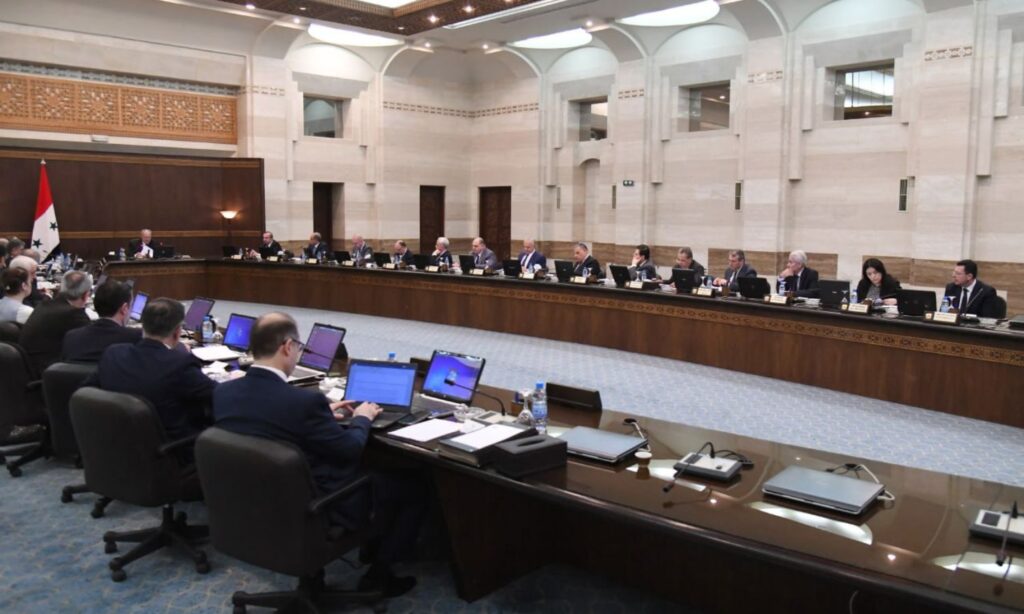The Council of Ministers of the Syrian regime government has requested holders of electronic cards (smart cards) to open bank accounts in the name of the cardholder within a period of three months, in preparation for transferring support funds to these accounts.
The General Organization for Radio and TV published today, Tuesday 25th June, parts of the Council of Ministers meeting, which included demands to open bank accounts, considering the step in line with the “tendency towards the restructuring of support towards carefully studied and gradual cash support.”
The Syrian regime government believes that restructuring support aims to direct it to the beneficiaries to achieve justice and support the most needy segments, and to cover the deficit in the state’s general budget, according to what Minister of Economy and Foreign Trade, Samer al-Khalil, said at the beginning of proposing the project in February 2022.
At that time, the minister said that providing support would return to every employee excluded from government support immediately, whether military, civilian, retired, or still working, but this issue has not been addressed to date, despite two years of its discussion.
With the beginning of its implementation in February 2022, the decision to restructure support sparked controversy among Syrians, as the regime’s government excluded categories of Syrians from government support, and restructuring resulted in hundreds of thousands of errors as support was withdrawn from families that did not meet the exclusion criteria.
Upon discovering the errors caused by the restructuring of support, the government said that any segments excluded from government support have the right to submit objection requests if there was any change in their data that led to their exclusion, according to the Ministry of Communications.
The number of objections to the exclusion mechanism exceeded 250 thousand objections within a few days of its announcement.
Two days before the mechanism’s implementation began, the Assistant Minister of Communications in the regime’s government, Fadia Suleiman, announced a new study that included the exclusion of approximately 596,628 families holding smart cards, accounting for about 15% of the families receiving support today.
Regarding people residing outside Syria, the Assistant Minister stated that around 687 thousand people outside Syria benefit from government support, explaining that if the head of the family was traveling abroad, the entire family would be excluded from support, while only the quotas of one individual (bread and food supplies) will be canceled if they are traveling and their name still appears on the electronic card.
The Assistant Minister confirmed that the smart card will remain active for the family from which support is lifted, to enable it to obtain the materials distributed through it at their unsubsidized price.
Grim economic situation
During a special interview with Saudi Arabia’s “Al Arabiya” channel last May, the UN special envoy for Syria, Geir Pedersen, conducted a quick survey of the most prominent pending issues in the Syrian file, starting with the issue of detainees and missing persons, the economic and humanitarian crisis, and ending with the presence of about 12 million internally displaced persons.
He said, “Assad cannot determine the outcome of the conflict in Syria, nor can the Russians, Iranians, Turks, or Americans, no one can,” considering that the situation in Syria is “extremely grim” with about 16.9 million people in need of humanitarian aid and nine out of ten people suffering from poverty.
In Syria, 16.7 million people need humanitarian assistance, an increase of 9% over 2023, according to estimates by the United Nations High Commissioner for Refugees (UNHCR).
According to statistics released last February by the World Food Programme (WFP) on the number of people suffering from food insecurity in Syria, 80% of the Syrian population needs some form of humanitarian aid in 2024.
About 55% of the population in Syria, or 12.9 million people, suffer from food insecurity, with 3.1 million of them suffering severe food insecurity.

